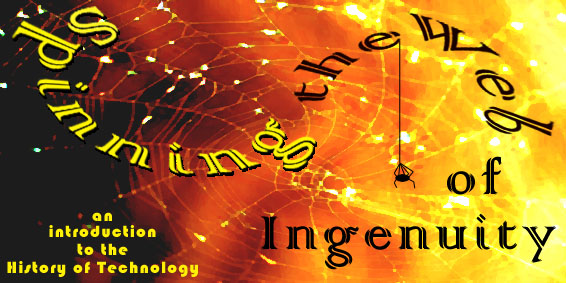| COURSE SCHEDULE
|
| Week 1. Stretching Limits--Taming ...
|
1. ... material elements
2. ... human elements |
Reading: Week
1 Readings
Hoban, chs 1-4 |
| Week 2. Building Sites--Shaping ...
|
3. ... stuff of everyday strife
4. ... essence of everyday life |
Reading: Week
2 Readings
Pacey, chs 1 & 2; Hoban, chs 5-8 |
| Week 3. Structuring Lives--Measuring ...
|
5. ... space
6. ... time |
Reading: Week
3 Readings
Pacey, chs 3 & 4; Hoban, chs, 9-11 |
| Week 4. Mastering Materials--Gathering ...
|
7. ... material resources
8. ... human resources
|
Reading: Week
4 Readings
Pacey, chs 5 & 6; Hoban, chs 12 & 13 |
| Week 5. Improving Processes--Wedding ...
|
9. ... science
10. ... technology |
Reading: Week
5 Readings
Pacey, chs 7 & 8 |
| Week 6. Imagining Possibilities--Extending ...
|
11. ... material capabilities
12. ... human capabilities |
Reading: Week
6 Readings
Pacey, chs 9 & 10; Hoban, ch 14 |
| Week 7. Constructing Realities--Shrinking ...
|
13. ... time
14. ... space |
Reading: Week
7 Readings
Hoban, ch 15; Huxley, Author's Forward, chs 1-6 |
| Week 8. Anticipating Consequences--Constraining ...
|
15. ... the natural
16. ... the artificial
| Reading: Week
8 Readings
Huxley, chs 7-9; Hoban, ch 16 |
| Week 9. Designing Alternatives--Perfecting ...
|
17. ... worlds
18. ... people |
Reading : Week
9 Readings
Huxley, chs 10-18; Hoban, ch 17 |
| Week 10. Conceiving Futures--Finding ...
|
19. ... the 1 big 1
20. ... tomorrow |
Reading: Week
10 Readings
Hoban, ch 18 |
|
Spinning and Weaving
Technology is about doing. If you'd like to have an opportunity to produce a useful item from raw materials, try your hand at spinning your own thread out of fiber and then weaving that thread into a piece of cloth on a simple handmade loom. Experience for yourself the struggle, frustration, satisfaction and pride that comes with mastering an age-old craft; the mental and physical strain of working at tedious, repetitive tasks for hours at a time; and the mixed sense of awe, relief, loss and rage when a machine is invented that can replicate, perhaps even surpass, your production capability. |

